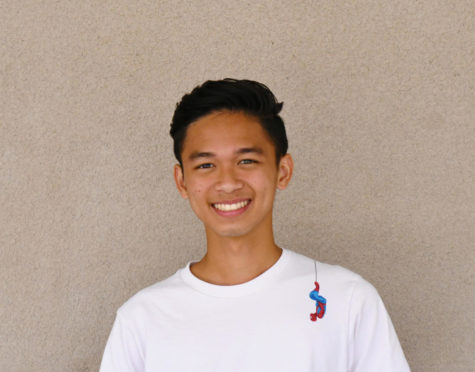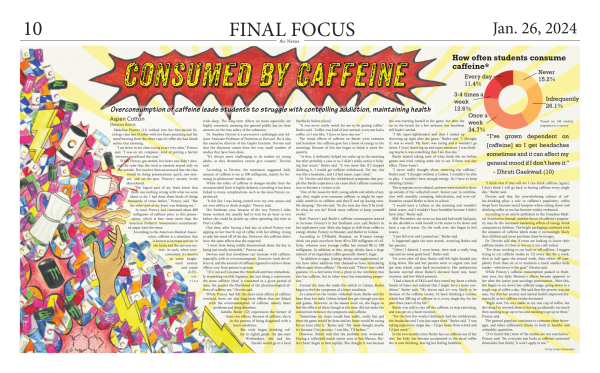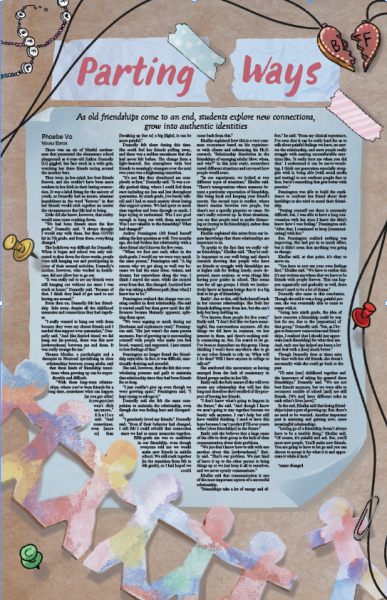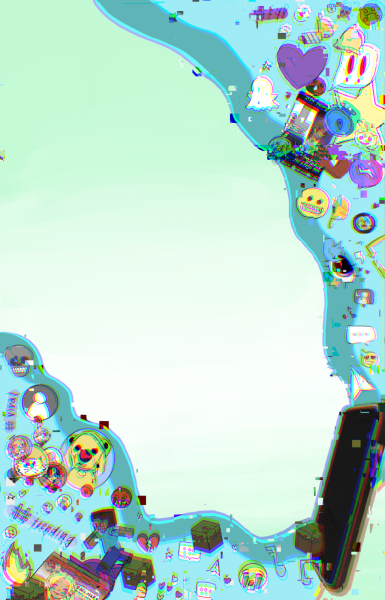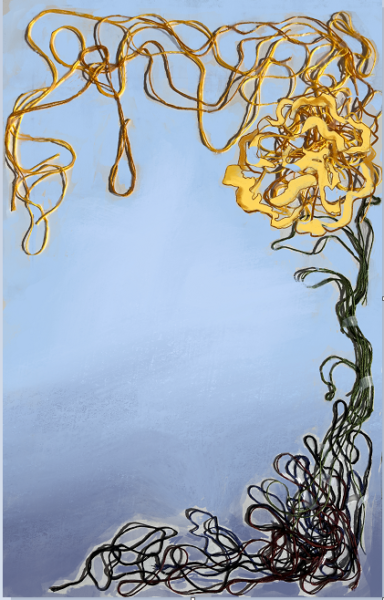Translating Characters into Identity
With the help of language, students make sense of the muddled alphabet soup cooked up by their conflict between two cultures

Rachel Kang (12) chatted with friends regarding their plans to grab authentic tteokbokki (떡볶이) and gimbap (김밥) on their next trip to Korea. Compared to her English, her tone of voice in Korean was more dynamic and at a higher pitch. She felt at peace with every syllable and word she spoke, better expressing herself than she could in English.
Speaking and learning Korean as she grew up defined Kang’s at-home life and gave her a close connection to her heritage.
“Growing up in a bilingual household, Korean was crucial from a young age,” she said. “It strengthened the bond I had with my parents as only my dad was fluent in English, but my mom was not.”
During quarantine, when Kang’s family moved to a new neighborhood and her father was off on a business trip, Kang and her mother were left to complete the finishing touches to make their house into a home.
“When we have to call places like Home Depot, [my mom] usually let’s me know what she wants to ask about and I directly translate,” she said.”
To this day, Kang’s mother is still not fluent but Kang uses her ability to speak Korean and English at the same time to assist her mother, strengthening their relationship with one another.
Kang was born and raised in America but was able to visit Korea a multitude of times throughout her life, even attending school there for two months, and Kang said this further solidified her interest in the culture.
Meghan Driver is a professor of classical studies and second language at Michigan State University and specializes in second language acquisition. She said that with any language, there are many aspects that accompany the usage of it, including a connection to one’s culture.
“There are some times where we lose a language and stay connected to the culture, but there [are also instances] when using a language, the culture really comes out,” she said. “A lot of it is passed down through generations, so there is definitely a connection between culture and language in a lot of ways.”
Kang said that her ability to be a Korean speaker has made the nearly 7,000-mile distance from her home here in America to her home in Korea feel a bit smaller.
“I grew up spending a lot of my summers in Korea, but I never got to experience what it’s like to have your grandparents close by every day where they could come over and have lunch and what not,” she said. “Ever since I was young, I’d make phone calls with them almost daily, and knowing Korean allowed me to form that bond with them. I can never say that I fully understand Korean culture even though I speak the language, but I’m very proud of my heritage and do love Korea as well.”
Raphaël Atlante (11) was born and raised in Marseille, France. For more than half of his life he lived in his country of origin, but then at age 10, his family decided to move to the United States. Unlike most students at Westview who were born in the U.S. after their families migrated or moved to the U.S. at a young age, Atlante had that direct connection to his heritage and cultural roots for the formative years of his life.
Atlante had to learn English upon his arrival in the United States, and despite his early connection to his culture, he had to become accustomed to the new one that surrounded him.
However, his desire to assimilate into his unfamiliar new home was a balancing act. Atlante said that he started to feel disconnected from French culture when he began living in America.
“There’s a lot of everyday circumstances that are different from French culture and American [culture],” he said. “Especially speaking French every day, with friends and family members.”
And it wasn’t just culture. Daily customs and familiar sights were completely out of the picture in his new life.
The bustling street markets filled with fresh baked goods in the early morning, which the youngest child was sent on a journey to retrieve the scrumptious pastries, was not really a thing to experience in the U.S.
“I guess it’s not just traditions that I miss,” he said. “I miss the way I was treated there. And it may sound cliché, but I also miss the food.”
At first, Atlante had some difficulty adjusting and adapting to the Western lifestyle. There are a lot of aspects that Atlante experienced in France that aren’t common in the U.S.
“It’s really different being in France than America,” he said. “There’s a totally different kind of energy and [set of] characteristics [in the U.S.]. There is a lot of stuff that French people do on a daily basis that I don’t necessarily do [in America] like eating dinner earlier or getting pastries every morning for breakfast.”
Despite the cultural connections that Kang finds through her native language, not every student has the opportunity or the resources to learn another language, even their own mother tongue.
For a while, Jacelyn Macaraeg (11) believed that it wasn’t a big deal that she couldn’t speak Tagalog. Both of her parents couldn’t speak it but understood it, so she said it didn’t really seem like a necessity in her life.
Driver said that there are many reasons as to why families decide not to pass on their heritage language to their children.
“It really depends on the situation of the family,” Driver said. “Some people can be afraid because of xenophobia or racism. Some are hesitant because society dictates that some languages are more important than others and you could be putting yourself in danger sometimes.”
Similarly to her parents, Macaraeg was raised in America and grew up as a second-generation American.
That was until the summer before her freshman year when she visited her cousins in the Philippines for the first time and realized just how important her native language was to her.
“My cousins only spoke Tagalog and [very little] English,” Macaraeg said. “They were so nice to me and wanted to know me more. Because of [that], I became motivated to learn Tagalog so that I could break the language barrier between my cousins in the Philippines and me.”
Driver said that family is an excellent driving force for someone who wishes to learn another language.
“For people who have that cultural background or heritage with their family, it can be super motivating [to learn that language],” she said.
She also added that when someone has a family history tied in with their native language, part of the motivation to learn that same language becomes personal.
With hopes to one day connect with her cousins on a more interpersonal level, learning Tagalog through taking Filipino 5-6 has allowed Macaraeg to bridge the gap with her relatives in the Philippines.
“Since my parents only know how to understand Tagalog, my family usually relies on my grandparents when communicating with others in the Philippines,” she said. “Taking Tagalog will hopefully help me fill the gap, so that my generation can carry on my culture and native language.”
Macaraeg said she firmly believes that learning Tagalog makes her feel more connected to her cultural and ancestral roots and provides her the Filipino experience that she didn’t have growing up.
“It’s mainly so that us Filipino-Americans don’t lose our touch with our roots because I see this with my own family, as they don’t do simple customs like asking for blessings and addressing elders, which are both signs of respect,” she said.
With two generations of Macaraeg’s family living in the United States, she said she feels as though the Filipino culture isn’t as present in her family’s life as it should be.
“Taking advantage and utilizing the Filipino classes offered at Westview enables me to spread the language to my family and connect me to the Philippines,” she said. “In class, our teacher tries to incorporate Tagalog in almost everything, which helps give a feel on how speaking on a daily basis is like.”
According to Driver, language helps people find their identity, who they are, and where they are from.
“When you actually learn your heritage language, you actually get access to a whole part of your background that maybe you didn’t have before,” she said. “It’s a two-way opener that helps you find not only a part of your own identity, but opens you up to the identities of your family as well.”
Kang said that speaking Korean helps empower her sense of self and allows her to empathize and advocate for foreigners from Korea who are struggling to speak English.
“There are actually Korean transfer students who have come to our school,” she said. “I took it as my opportunity to help them out by helping them with their English, keeping in touch and being a new friend, and even giving them a tour of San Diego.
Despite being a Korean-American, Kang said she often wishes she could resonate more with her family’s cultural roots.
“I would like to identify myself more as a Korean,” she said. “But no matter how you look at it, I’m definitely more American.”
On the contrary, Atlante identifies as French more than American and said he feels that fluency in French and his history of living in France plays an important role in his life.
To his enthusiasm, every time Atlante’s World History class includes some topic about France, Atlante is always the center of attention.
“For example, right now we’re studying World War II and there’s a lot of French people so it’s pretty fun getting called on knowing the right pronunciation and who they are,” he said. “Another time there was a question regarding French geography and I was like, ‘yeah I already knew all the answers.”
Macaraeg similarly believes that speaking a native language is really important as it is passed down from ancestors and serves as a way to connect to her grandparents, the legacy of her ancestors, and where she’s from.
“My grandparents were our only support and communication with the Philippines,” she said. “I thought by learning [Tagalog] I could connect with [my grandparents]. because Tagalog was their first language. They had to adjust to America and I’m doing the same with Tagalog for them.”
Macaraeg said she hopes to use her Tagalog skills to incorporate her ancestral roots with her American lifestyle.
“Even though I wasn’t born in the Philippines, speak fluent Tagalog, or know every detail about Filipino culture, I still acknowledge where I came from and am proud to embrace the Filipino [side] of myself,” she said.
Until her exposure to learning Tagalog, Macaraeg had little knowledge about what it’s actually like to live in the Philippines. She didn’t really have a clear picture.
However, through her learning experience in the Filipino courses, she was able to adjust her outlook on her culture and give her a glimpse of her heritage.
“Learning Tagalog changed my perspective about how I viewed Filipino culture in a way that made me value it much more than before, like with cultural dances like Tinikling, and Filipino values,” she said.
Driver said that even in the early learning stages of a language, a learner will be exposed to much more than they are accustomed to.
“Two years of learning a language is not quite enough to officially learn it,” she said. “But it opens up your world and lets you know that there are other places and other things. It makes you think about what another language can do.”
While learning English, Atlante also noticed a lot of differences in the linguistic diversity and cultural values between his European roots and Western culture.
“When you talk to someone [in the U.S.] you just call them by their name, there’s no high way of talking to someone,” he said. “In France, there are two ways of talking to people. The first is a familiar way with friends and the other is more formal for elders and a sign of respect.”
Through his upbringing in France, Atlante also developed certain values like a high regard of respect for others through his culture’s custom to address elders.
“They don’t even necessarily have to be old, it can be your teacher or new people you meet,” he said. “It’s just a way to show respect to others.”
Despite the clashing cultures, Atlante was still able to find a way to connect both in a way that he can dwell in both.
“In France there’s a lot of popular songs that you listen to that are in English and movies as well that I couldn’t understand,” he said. “Now, I can listen and really understand those famous songs and watch more movies.”
Atlante also said that his English speaking will become a benefit in the long run.
“I feel that the more languages I can speak, the more I can connect with people,” he said. “I can speak with another French person in America but can directly speak English to an American visiting France.”
Atlante’s acquisition of English definitely has proved a strong cornerstone and eye-opener to his new life in the United States.
Despite admitting to losing a bit of touch of French culture six years after his family moved, Atlante still finds strength and stability in both English and French.
In Macaraeg’s next visit to the Philippines, she no longer needs to be intimidated by the language barrier between her and her cousins. In fact, Macaraeg said she hopes to surprise them with her new knowledge.
“When we would call or write letters to each other, my cousins were the ones who were always the ones trying to communicate in English since I barely knew Tagalog,” she said. “Since I am the one who lives in the states, I believe that I have more opportunities than them to learn another language, so by learning Tagalog I’ll be prepared to talk with them full on.”
